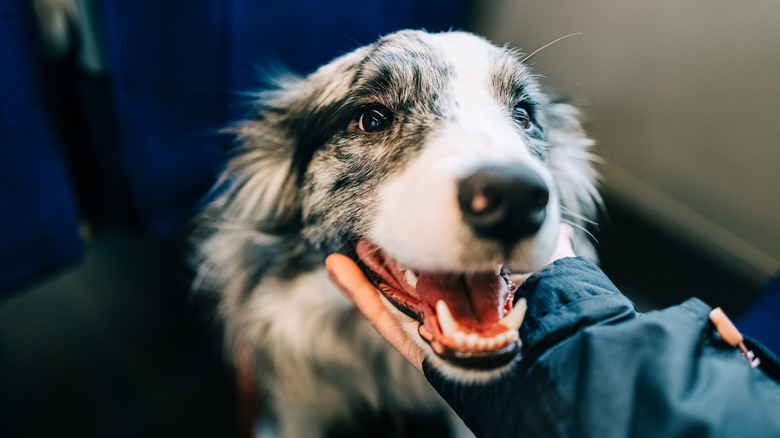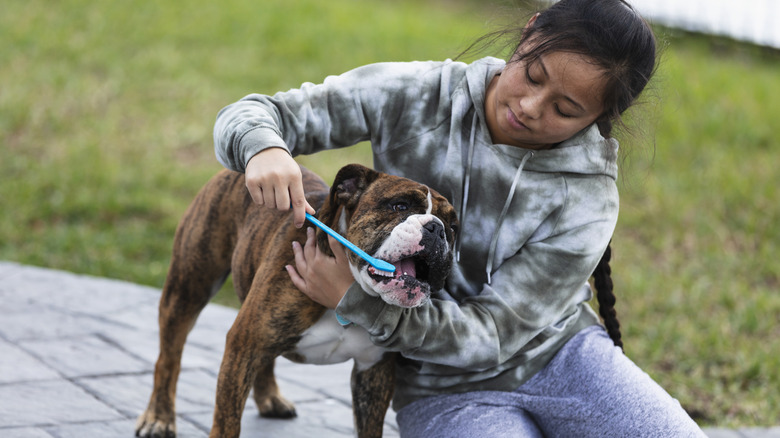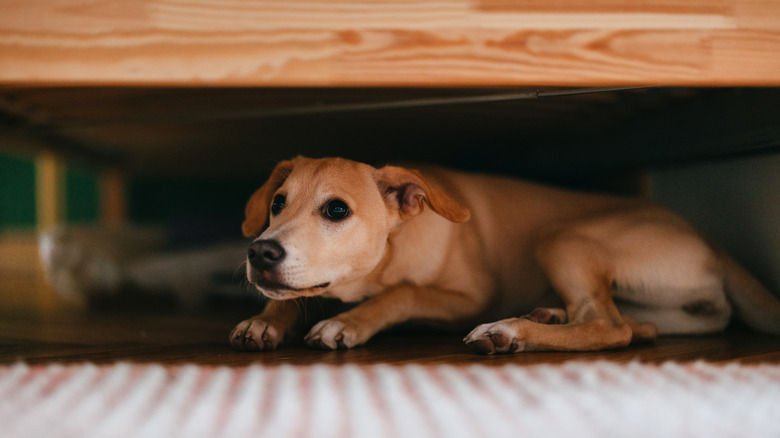What It Means When Your Dog's Jaw Is Quivering (And How To Fix It)
We may receive a commission on purchases made from links.
Those who have welcomed a dog into their hearts and homes will be familiar with the many curious actions and gestures it performs to the delight of its owners. While many of these behaviors, such as snoring, licking our hands when pet, or barking can be commonplace, some, such as a quivering jaw, can be more perplexing for pet parents when they occur.
There are several reasons why a dog's jaw may begin to quiver: arthritis or fracture of the jaw, mental struggles like separation anxiety, fear, or other stressors, gastrointestinal issues, a natural response to pheromones for a dog looking for a partner, a byproduct of seizures, or, in rare cases, inflammation from an ear infection or other muscles around the jaw. However, dental pain or discomfort, which can include a broken tooth, an abscess, or inflammation of the gums, is the most common cause behind a dog with a quivering jaw.
A vet visit is important for figuring out the cause of a quivering jaw, but additional signs can help pinpoint the cause. A quivering jaw related to your dog's teeth or gums may show signs such as bad breath, excessive drooling, or difficulty eating. Gastrointestinal issues can be suspected if the jaw quiver comes with symptoms like vomiting. A jaw fracture will show additional signs of swelling around the affected area, and arthritis effects can be visible in multiple joints beyond the jaw. If a dog is having a seizure, there are other steps you should take before worrying about a quivering jaw. Behavioral issues that lead to a quivering jaw can be addressed through training, but suspected medical issues should be brought to the attention of a veterinarian.
Dental care can help address jaw issues
If your dog's jaw has been quivering, dental issues may be to blame. Around 80% to 90% of dogs over the age of three show signs of some periodontal disease. If left unchecked, dental issues can increase the chances of more severe issues like heart and kidney disease. A veterinarian can determine the root cause of any discomfort around the mouth and help devise a plan to tackle dental problems or other health conditions causing the issue.
If your pup's jaw quivering checks out otherwise healthy, but your pup has some minor dental disease, these at-home steps can help. Learning how to brush your dog's teeth is an essential first step to proper dental care. Pet parents can start using a Virbac C.E.T. Oral Hygiene Kit and get their dogs used to brushing using a toothbrush or finger brush. Treats like Greenies Original Regular Natural Dog Dental Care Chews can promote proper dental care.
Natural ways to support a dog's teeth include probiotics like PetLab Co. Probiotics for Dogs, which also promotes proper gut health, and bone broth, like Brutus Bone Broth for Dogs, which also supports joints, both of which can help address other jaw-quivering causes, such as GI upset or arthritis, too. Adequate cleaning and support of a dog's teeth will help address problems before they happen. Importantly, regular at-home dental care will allow owners to look for potential problems before other signs of dental discomfort caused by inflammation or disease appear.
Addressing behavioral issues that cause quivering jaws
Before jumping to behavioral causes, a veterinarian should first rule out any other potential medical issues, such as arthritis, seizures, or ear inflammation, for proper treatment and medication. If a pet parent suspects a behavioral issue such as separation anxiety, fear, or excitement, these methods can help.
While there are available products and veterinary-prescribed medications to help relieve anxiety, stimulation and exercise can be a simple step to help alleviate the nervousness of a pooch; a tired dog is a happy dog. For low-energy dogs who won't exercise, mental stimulation with a toy like the KADTC Dog Chess Puzzle Toy can also help relieve any pent-up anxiety and offer distraction. Behavioral therapy with a trained behaviorist to redefine for your dog what being alone means can also help overcome anxiety.
For a fear response, a combination of desensitization and counterconditioning during training can help address a chattering mouth caused by nerves. This training gradually addresses and lowers a dog's fear response to a particular stimulus and can be worked on with a professional dog trainer. If your pup's jaw quivering is from excitement when smelling pheromones, there is not much an owner can do other than be aware that it could preface some unwanted behavior, such as running away in search of a mate. A furry friend with a quivering jaw may be an unexpected and worrying reaction for an owner. However, being attentive to potential health concerns and possible behavioral issues can help address the problem with less stress.
Always consult your veterinarian before making changes to your pet's diet, exercise, or care. To find an accredited veterinarian in your area, you can search the American Animal Hospital Association's online database.


